 Petzlover
Petzlover Hanover Hound is originated from Germany but Tenterfield Terrier is originated from Australia. Hanover Hound may grow 24 cm / 10 inches higher than Tenterfield Terrier. Hanover Hound may weigh 23 kg / 51 pounds more than Tenterfield Terrier. Both Hanover Hound and Tenterfield Terrier has same life span. Both Hanover Hound and Tenterfield Terrier has almost same litter size. Both Hanover Hound and Tenterfield Terrier requires Low Maintenance.
Hanover Hound is originated from Germany but Tenterfield Terrier is originated from Australia. Hanover Hound may grow 24 cm / 10 inches higher than Tenterfield Terrier. Hanover Hound may weigh 23 kg / 51 pounds more than Tenterfield Terrier. Both Hanover Hound and Tenterfield Terrier has same life span. Both Hanover Hound and Tenterfield Terrier has almost same litter size. Both Hanover Hound and Tenterfield Terrier requires Low Maintenance.
 Sometimes referred to as a Hanoverian Hound, this dog dates way back to the 17th century in Germany.
Sometimes referred to as a Hanoverian Hound, this dog dates way back to the 17th century in Germany.
This dog breed continues to be fairly rare today and has always been used as a hunting and tracking dog. It is believed the dog comes from bloodhounds dating back to medieval times. The dog isn’t recognized by the AKC but he is a member of the Scenthound group.
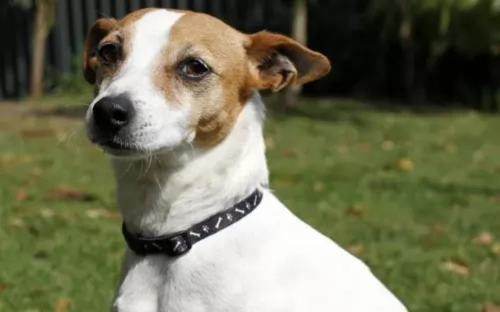 The ancestors of the Tenterfield Terrier came to Australia with the British and from them came this Australian breed. The English terriers were bred to be ratters on the ships to Australia. Today’s breed is a hardy, strong, athletic and agile dog. These first dogs were miniature Fox Terriers, bred for ratting. The miniature Fox Terrier was an established breed in the late 19th century in Australia with families and was know as a Mini Foxie. The breed became a steady presence in homes by the 1920’s.
The ancestors of the Tenterfield Terrier came to Australia with the British and from them came this Australian breed. The English terriers were bred to be ratters on the ships to Australia. Today’s breed is a hardy, strong, athletic and agile dog. These first dogs were miniature Fox Terriers, bred for ratting. The miniature Fox Terrier was an established breed in the late 19th century in Australia with families and was know as a Mini Foxie. The breed became a steady presence in homes by the 1920’s.
The breed might not have been named after the area of Tenterfield as many have guessed. Instead they may have been named after a breeder. The owner of the Tenterfield saddlery was called Tenterfield Saddler and he owned several of the breed. In 1990, Don Burke, a television personality suggested the breed be named the Tenterfield Terrier.
The Miniature Fox Terrier Club of South Australia. Now there were several clubs in Australia and a lot of disagreement about exactly what type of dog a miniature fox terrier was. Some did not think the name was legitimate, but they wanted recognition from the Australian National Kennel Club (ANKC). So, they became the Tenterfield Terrier Club of Australia in 1993. They were recognized by 2002.
Today the breed standard for the Tenterfield Terrier is different from the one for the Miniature Fox Terrier. They are now entirely separate breeds. In addition to the ANKC, the breed is recognized by the New Zealand Kennel Club but not by the AKC. It is also recognized by the American Pet Registry, Inc, the American Canine Registry and the Dog Registry of America, Inc.
 This is a sturdy, well built dog with a short, smooth, dense coat which is a reddish-brown color with brindling.
This is a sturdy, well built dog with a short, smooth, dense coat which is a reddish-brown color with brindling.
He is a well built, deep chested dog standing at about 50 – 55cm in height and weighing 48-53cm. He has the typical dark brown, soulful eyes of the Hound dog with long, broad, floppy ears.They usually have black noses, he has a deep chest, strong, straight legs and long, tapering tail.
Calm and gentle, the Hanover Hound is a loyal dog who bonds closely with his human family. When you socialize him he gets along well with children.
He is a hunting dog and loves nothing more than to be following some scent. You can call out his name, but he will not likely take notice, so determined is he to track down his prey, being known for his superb sense of smell.
His hunting instincts are strong and this means that you won't often find him being kept essentially as just a pet – they are first hunting dogs and then pets. Nonetheless, as already suggested, the Hanover Hound is more than capable of forming a strong bond with his human family, making a good family pet.
He is aloof and wary with strangers and this makes him a good watchdog. It is important to have him trained and socialized as then he becomes obedient and amicable when you need him to be like that around friends and family.
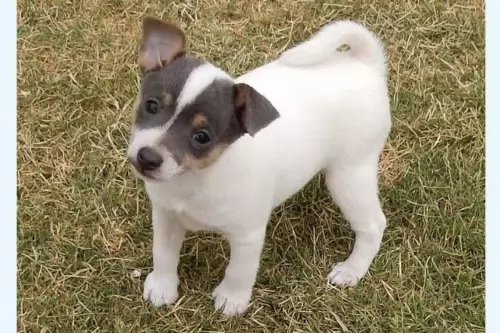 The Tenterfield Terrier is square and compact. He has a head shaped like a wedge and unusual in the terrier group. They have pricked ears and are predominantly white mixed with tan or black. They could also be tri-colored in black/tan and white or tan/liver and white. They have naturally occurring bob tails or docked tails. The nose is usually black unless the dog is liver colored, they have liver noses. The jaws are strong, and lips are tight with a strong neck.
The Tenterfield Terrier is square and compact. He has a head shaped like a wedge and unusual in the terrier group. They have pricked ears and are predominantly white mixed with tan or black. They could also be tri-colored in black/tan and white or tan/liver and white. They have naturally occurring bob tails or docked tails. The nose is usually black unless the dog is liver colored, they have liver noses. The jaws are strong, and lips are tight with a strong neck.
 The Hanover Hound is an intelligent dog breed that responds well to training and socialization. They are dedicated hunting dogs but they are loyal and loving to their human family.
The Hanover Hound is an intelligent dog breed that responds well to training and socialization. They are dedicated hunting dogs but they are loyal and loving to their human family.
He will require an owner who is active and on the go while being firm and consistent with his treatment of him.
When socialized, he makes a good friend of children too. Keep him busy, exercise him, provide him with good food and consistent love and attention and he'll make you a devoted hunting companion and friend.
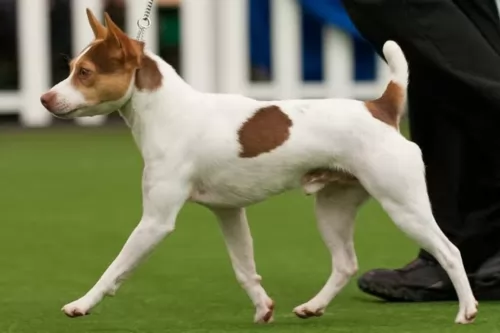 3.Adaptability – they need space even though they are small. They need a lot of exercise. They can adapt if they get another exercise. They can live in apartments and can play indoors as well as out.
3.Adaptability – they need space even though they are small. They need a lot of exercise. They can adapt if they get another exercise. They can live in apartments and can play indoors as well as out.
4.Learning ability – They are extremely intelligent, but they can be stubborn like all terriers.
 Capable of living to between 10 and 14 years of age, the Hanover Hound, like many other dogs, may well be prone to some of the more common dog illnesses there are.
Capable of living to between 10 and 14 years of age, the Hanover Hound, like many other dogs, may well be prone to some of the more common dog illnesses there are.
Because of his long, floppy ears, he will typically be more prone to developing otitis externa. This is why it is important to be checking your long, floppy-eared dog regularly and cleaning his ears to avoid wax- and dirt build-up and infection. Chronic ear infections will have to be treated by your vet.
You'll recognize the illness when you see your pet shaking his head often and scratching at his ears.
This is a genetic orthopedic disorder that affects many dogs and will eventually cause lameness. Hip dysplasia is due to malformed hip joints.
Eye diseases and problems with the eyelid can cause your pet a lot of discomfort as this is when an eyelid rolls in and then rubs against the eye.
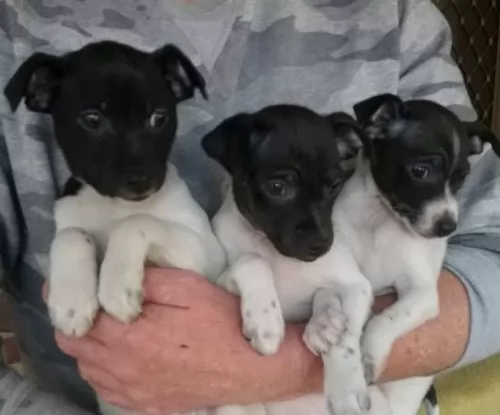 They are small in stature and because of their face they seem to have dental issues. The breed does not have a lot of health issues but deals with the same issues as many small terriers. Not all members of the breed are susceptible to these, but some are just like the Australian Terrier.
They are small in stature and because of their face they seem to have dental issues. The breed does not have a lot of health issues but deals with the same issues as many small terriers. Not all members of the breed are susceptible to these, but some are just like the Australian Terrier.
 The Hanover Hound is a hunting breed so he won’t easily adapt to life in the city with a tiny garden. He will need a large garden or a farm to run around in.
The Hanover Hound is a hunting breed so he won’t easily adapt to life in the city with a tiny garden. He will need a large garden or a farm to run around in.
He is a hunting dog that loves to put his nose to the ground and to follow a scent. This is a dog breed which will need to be provided with a good amount of exercise every day to ensure his happiness and health.
As a large dog breed, you want to be sure to be feeding him a high quality food. It is always a good idea to add in some home-made food to his kibble. Read the packaging carefully of commercial manufactured dog foods and make sure you get food that is geared towards large, active breed dogs.
Add in cooked food such as cooked chicken, vegetables or brown rice and pasta and remember to include some raw meat into his diet from time to time.
Before dogs were domesticated they would eat raw meat as opposed to harmful grain based commercial dog foods of today. Benefits of adding in some raw meat from time to time include healthier skin, more energy and shinier coats and eyes. Make sure your pet has a constant supply of fresh, cool water.
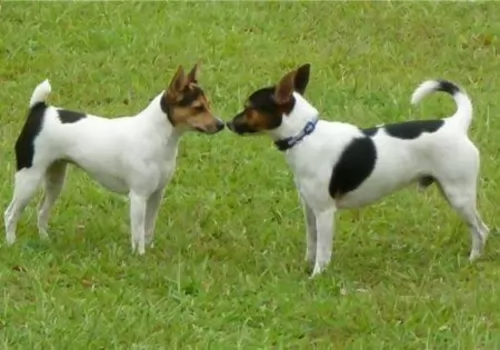 1.Feeding the puppy – Don’t overfeed but do feed high quality puppy food for small breeds and terriers.
1.Feeding the puppy – Don’t overfeed but do feed high quality puppy food for small breeds and terriers.
2.Feeding the adult – This is an active breed but don’t overfeed. Feed a high quality adult dog food for terriers or small breeds. Feed 2 times a day.
4. Games and Exercises – The breed has a high energy level and needs a lot of exercise. He is a terrier and loves to “go to ground”. Play activities that allow him to do that are best. He plays barn hunt, lure coursing and terrier specific competitions.